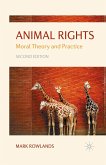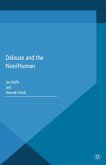In this 2nd edition the author has substantially revised his book throughout, updating the moral arguments and adding a chapter on animal minds. Importantly, rather than being a polemic on animal rights, this book is also a considered and imaginative evaluation of moral theory as explored through the issue of animal rights.
'Those concerned with animal ethics owe a debt of gratitude to Mark Rowlands. He has written what is without doubt the best defense of animal rights from a contractarian position, or perhaps from any position. Rowlands writes in an admirably clear and engaging manner, guaranteed to lure the reader into joining the spirited conversation.' - Susan J. Armstrong, Professor Emerita, Department of Philosophy, Humboldt State University, Arcata, Canada
'Philosophers, in particular, and those interested in animal rights issues, in general, should be grateful for the publication of this book for several reasons. First, familiar defenses of the animal rights position offered by Peter Singer and Tom Regan are examined anew, such that even those who are very familiar with these defenses see them in a new light. Second, the more recent debate in virtue ethics regarding treatment of animals (between Rosalind Hursthouse and Roger Scruton) is treated very insightfully. Third, Rowlands develops his own powerful version of a contractarian account of animal rights based on Rawlsian principles. And fourth, he also treats the animal rights issue in novel terms in light of recent debates in philosophy of mind and in relation to a fantastic thought experiment wherein brilliant aliens start farming and eating human beings because of their intellectual inferiority. This is not a book to be ignored!' - Daniel A. Dombrowski, Professor of Philosophy, Seattle University, USA
'Philosophers, in particular, and those interested in animal rights issues, in general, should be grateful for the publication of this book for several reasons. First, familiar defenses of the animal rights position offered by Peter Singer and Tom Regan are examined anew, such that even those who are very familiar with these defenses see them in a new light. Second, the more recent debate in virtue ethics regarding treatment of animals (between Rosalind Hursthouse and Roger Scruton) is treated very insightfully. Third, Rowlands develops his own powerful version of a contractarian account of animal rights based on Rawlsian principles. And fourth, he also treats the animal rights issue in novel terms in light of recent debates in philosophy of mind and in relation to a fantastic thought experiment wherein brilliant aliens start farming and eating human beings because of their intellectual inferiority. This is not a book to be ignored!' - Daniel A. Dombrowski, Professor of Philosophy, Seattle University, USA








